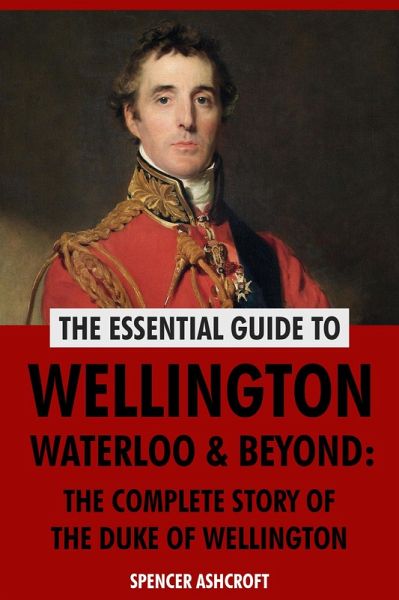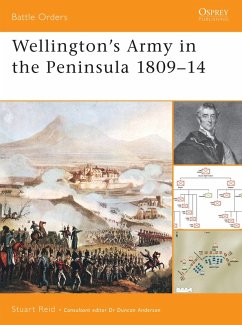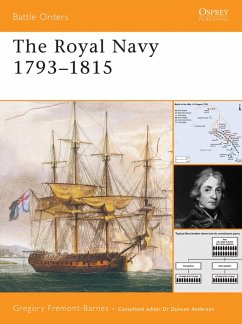
Wellington, Waterloo & Beyond: The Complete Story of the Duke of Wellington (eBook, ePUB)

PAYBACK Punkte
0 °P sammeln!
The Duke of Wellington, Arthur Wellesley, stands as one of history's most iconic figures. Revered as a military genius, a steadfast statesman, and a man of remarkable determination, his legacy has endured for nearly two centuries. The title "Iron Duke" was given to him not only for his resilience on the battlefield but also for his unwavering character in the face of challenges. In this preface, we seek to introduce the essence of the man behind the myth, a man whose life and career were marked by remarkable feats of leadership, military brilliance, and political astuteness.Arthur Wellesley wa...
The Duke of Wellington, Arthur Wellesley, stands as one of history's most iconic figures. Revered as a military genius, a steadfast statesman, and a man of remarkable determination, his legacy has endured for nearly two centuries. The title "Iron Duke" was given to him not only for his resilience on the battlefield but also for his unwavering character in the face of challenges. In this preface, we seek to introduce the essence of the man behind the myth, a man whose life and career were marked by remarkable feats of leadership, military brilliance, and political astuteness.
Arthur Wellesley was born on May 1, 1769, in Dublin, Ireland, into an aristocratic family. His early life may have seemed unremarkable, yet it laid the groundwork for the extraordinary journey that would later define his legacy. With a strict military upbringing, his formative years were shaped by discipline and an unwavering sense of duty, which would later become hallmarks of his career. Wellesley's early education and experiences were instrumental in shaping his worldview, setting the stage for the man who would emerge as a key figure in the Napoleonic Wars.
However, the Duke's reputation as a leader was not without its controversies. His uncompromising nature often led to friction with his peers, both military and political, while his staunch opposition to political reform earned him criticism from more progressive factions. Yet, despite the challenges and setbacks he faced, Wellington's achievements remain towering, and his impact on the course of history cannot be overstated.
Throughout his life, Wellington was often seen as a man of contrasts. In private, he was known to be reserved and, at times, even aloof. Yet, in public, he displayed the decisive authority that would come to define his command. This duality - the reticent private individual and the forceful public figure - made him a man who could both inspire loyalty and provoke opposition in equal measure. His leadership during the Peninsular War, a conflict that spanned from 1808 to 1814, cemented his status as one of Britain's most capable generals. There, he faced not only the military genius of Napoleon's forces but also the political and logistical challenges of coordinating an international effort across Spain and Portugal.
Yet, Wellington was more than just a soldier. After his military service, he transitioned into a prominent political role, serving as Prime Minister and guiding Britain through a period of political upheaval and social change. His political career was shaped by his military experience, and he often took a conservative approach to governance, preferring stability over rapid reform. His leadership helped steer Britain through the aftermath of the Napoleonic Wars and into a new era of peace and prosperity, though his reluctance to embrace the social changes of the time would leave him at odds with the more progressive elements of British society.
As we embark on this exploration of the life and legacy of the Duke of Wellington, we will look at the various stages of his career and personal life, from his early years in Ireland to his eventual death in 1852. We will examine the forces that shaped him as a man and as a leader, and we will delve into the defining moments that secured his place in history. In doing so, we hope to provide a deeper understanding of the man who rose from humble beginnings to become one of the most influential figures of his time, leaving an indelible mark on both military and political history.
Arthur Wellesley was born on May 1, 1769, in Dublin, Ireland, into an aristocratic family. His early life may have seemed unremarkable, yet it laid the groundwork for the extraordinary journey that would later define his legacy. With a strict military upbringing, his formative years were shaped by discipline and an unwavering sense of duty, which would later become hallmarks of his career. Wellesley's early education and experiences were instrumental in shaping his worldview, setting the stage for the man who would emerge as a key figure in the Napoleonic Wars.
However, the Duke's reputation as a leader was not without its controversies. His uncompromising nature often led to friction with his peers, both military and political, while his staunch opposition to political reform earned him criticism from more progressive factions. Yet, despite the challenges and setbacks he faced, Wellington's achievements remain towering, and his impact on the course of history cannot be overstated.
Throughout his life, Wellington was often seen as a man of contrasts. In private, he was known to be reserved and, at times, even aloof. Yet, in public, he displayed the decisive authority that would come to define his command. This duality - the reticent private individual and the forceful public figure - made him a man who could both inspire loyalty and provoke opposition in equal measure. His leadership during the Peninsular War, a conflict that spanned from 1808 to 1814, cemented his status as one of Britain's most capable generals. There, he faced not only the military genius of Napoleon's forces but also the political and logistical challenges of coordinating an international effort across Spain and Portugal.
Yet, Wellington was more than just a soldier. After his military service, he transitioned into a prominent political role, serving as Prime Minister and guiding Britain through a period of political upheaval and social change. His political career was shaped by his military experience, and he often took a conservative approach to governance, preferring stability over rapid reform. His leadership helped steer Britain through the aftermath of the Napoleonic Wars and into a new era of peace and prosperity, though his reluctance to embrace the social changes of the time would leave him at odds with the more progressive elements of British society.
As we embark on this exploration of the life and legacy of the Duke of Wellington, we will look at the various stages of his career and personal life, from his early years in Ireland to his eventual death in 1852. We will examine the forces that shaped him as a man and as a leader, and we will delve into the defining moments that secured his place in history. In doing so, we hope to provide a deeper understanding of the man who rose from humble beginnings to become one of the most influential figures of his time, leaving an indelible mark on both military and political history.
Dieser Download kann aus rechtlichen Gründen nur mit Rechnungsadresse in A, B, CY, CZ, D, DK, EW, E, FIN, F, GR, H, IRL, I, LT, L, LR, M, NL, PL, P, R, S, SLO, SK ausgeliefert werden.













